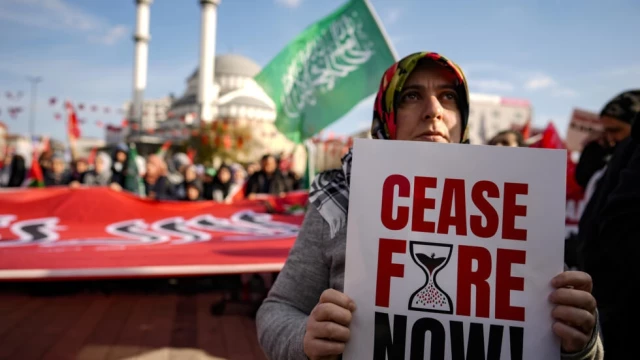Turkey has cut off trade with Israel as bilateral relations deteriorate over the Gaza conflict.
The move follows domestic calls for a tougher stance against Israel, while Turkish President Recep Tayyip Erdogan is seeking a more prominent regional role.
The Turkish Trade Ministry announced Friday that all exports and imports with Israel have been cut until uninterrupted and adequate humanitarian aid is allowed into Gaza.
The Israeli foreign minister, Israel Katz, was quick to condemn the move, saying it violated trade agreements and was the action was that of a "dictator".
It follows Erdogan's high-profile meeting with Hamas leader Ismail Haniyeh last month.
Domestic criticism
Erdogan's actions are seen as an attempt to quell growing domestic criticism of his complicated stance on the war – on one hand maintaining trade with Israel, while on the other condemning the country's war with Hamas.
"In order to convince conservative voters that there is no such thing as a hypocritical approach... they are taking a tougher stance and necessary measures," says Selin Nasi, a visiting fellow at the London School of Economics.
Nasi says Erdogan could further deepen Turkey's ties with Hamas, especially if cut theirs.
"We know that Qatar has been facing a lot of pressure in the international arena because of its ties with Hamas," she points out.
"Turkey might emerge as a potential candidate country to host Hamas if Qatar decides to send Hamas members abroad."
Regional cooperation?
Erdogan's party was handed a thumping defeat in March local elections, which saw many of his traditional conservative religious voters abstaining or voting for opposition parties – a move blamed in part on ongoing trade ties with Israel.
However, Ankara is seeking a wider role in resolving the Gaza conflict. Erdogan is also stepping up diplomatic efforts with Egypt after hosting Egyptian foreign minister Sameh Shoukry in April.
Relations between Turkey and Egypt have been warming after years of tensions, and analysts say there's room for cooperation.
"Both are very active in the rhetorical space in terms of their deep sympathy for the Palestinians in Gaza. At the same time, they maintain their diplomatic and security ties with Israel," says Jalel Harchaoui at the Royal United Services Institute in London.
"Both are known particularly Egypt, from Washington's perspective – for their direct communication line [with Hamas]. Both use that as a source of leverage vis-a-vis the West," he explains.
But analysts warn Erdogan's public attacks on Israeli Prime Minister Benjamin Netanyahu limit any mediating role for Turkey.
"At some point, the government has to moderate its tone, to repair its dialogue with Israel, because as it stands Turkey is no longer perceived as an impartial, third-party actor that can take on a role as a mediator," says Nasi.
She nonetheless believes there is room for Ankara to play a constructive role.
"Instead of perhaps endorsing Hamas, Turkey has to shift to a more balanced position between Hamas and Fatah and perhaps put its energy and resources into reconciling different rival Palestinian factions."
Washington visit postponed
Erdogan this month blamed Iran and Israel for increasing tensions, a break from only criticising Israel. Analysts say Turkey's close ties to Hamas could counter Iran's influence on the group.
However, Erdogan's overtures to Hamas were a factor in the postponement of a planned visit to Washington in May, which was blamed on scheduling issues.
"It's impossible not to rule out Gaza as one of the reasons for the cancellation," said Asli Aydintasbas, a visiting fellow at the Brookings Institution in Washington.
"I think at a time when people are talking about mass graves and there are protests all around US campuses, the Turkish president does not want to be seen with the president of the United States," she suggests.
However, Aydintasbas suspects Washington, too, may not be unhappy about that Erdogan's visit was put on hold.
"I don't think the White House is in a place for all types of reasons, including the domestic difficulty of this issue to be hosting a world leader who's going to criticise in front of cameras the US position on Gaza," she says.
Despite the visit's postponement, Washington and Ankara say they remain committed to high-level cooperation.
While doubts remain about what meaningful role Turkey can play in resolving the Gaza conflict, given the scale of the crisis, the region needs all the help it can get.




















